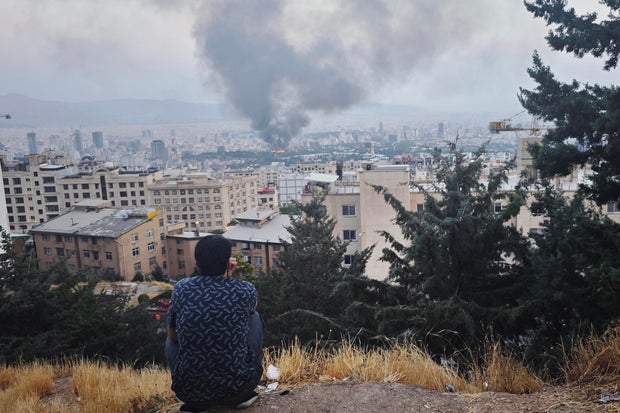American cyclist trapped in Iran talks about his nervous escape as Israel “bombs keep falling”

A champagne bottle popped up on the Atlantic coast of Portugal in February, 32-year-old United States Ian Anderson Set out to realize his dream of cycling on seven continents of the world. He planned to ride for 10 months and covered about 10,000 miles to reach his final destination.
However, he has no plans to have Israel launch a war against Iran.
Anderson was filled with excitement and anxiety when he crossed Iran on June 1.
“I was nervous. I was thinking, now we were in some unknown territory,” he said. “But I immediately felt comforted by the positive experiences and generous, generous people I met on the road.”
Ian Anderson
He said he was “surprised every day” and curious Iranians invited him to have tea or provide him with food, and even tried to dine in a restaurant.
On June 13, this changed when Israel began bombing Iran’s nuclear and military sites.
“There is no external hostility, but I just read people’s body language and their facial expressions,” Anderson said. “And I know I’m in danger because people think Israel and the United States were tied up at that time, because bombs kept falling and missiles were constantly shocked.”
He and his local Iranian guide Reza decided to bend over for two days in a hotel in a village called Harijan, about 45 miles north of Tehran.
Andersen said Reza, who became his friend, advised him to avoid telling others that he is American and avoid talking to people where possible. But he said he slipped and revealed his nationality to some local travelers who joined them at the hotel.
“They weren’t happy with the fact that they had to share a hotel with the ‘that American’ there,” Anderson said.
On June 15, Andersen heard an Israeli bomb explode in the distance. On the same day, he received an email from the U.S. State Department, giving him the option of Americans who wish to leave Iran based on their current location. He thought his best option was to reach Azerbaijan for eight hours north around the Caspian Sea.
As residents flowed out of Tehran, he and Reza were quickly flowed by steady flow. They passed gas stations with long cars and many military checkpoints.
“It’s really painful,” he said. “Maybe the idea of being pulled at one of the military checkpoints.”
Getty Images
“Reza, my guide, told me that he can’t protect me anymore, that really shocked me, right? Because he is my guide. He is my guide, very stable, strong, reliable person.
Anderson said he became easier and easier as we got away. “They ended up with no doubt about the border between Iran and Azerbaijan.
But the most disturbing part of the final day is about to begin, as he is not interviewed once, but twice by Iranian officials – the normal border police, and then the Iranian Revolutionary Guard Corps.
In the second interview, he was withdrawn from the crowd and brought into the back room of the storage closet in the makeshift barracks.
“That’s what I think, ‘Well, I have a 50-50 chance to be seen as bargaining chips or further inquiries,” he said. “In fact, the interview is less than a minute.”
“I went back to the night, picked up the bike and actually went into Azerbaijan, and I half hoped they called me back. I was like, ‘Some questions. Well, why, why is it so easy?’ But they didn’t, I was able to enter Azerbaijan.”
On the Internet firewall in Iran, he was able to send messages to his family before checking into the first hotel he could find and then fall asleep for 12 hours to relieve and exhaustion.
Now, as the Israel-Iran conflict drags on, Anderson says he has a lot of thought about the spillover effect of anyone with a U.S. passport and travel abroad.
He said he registered for a trip in the United States The State Council’s Steps Planit sends notifications and updates from specific countries based on the traveler’s actions. That’s how he knew to go to Azerbaijan, and he urged all Americans who travel abroad to do the same.
Anderson also said he might not have left the country if it weren’t for his Iran guide. He hopes to raise funds for Reza and his family, who are still in Iran.
He also intends to continue riding his bike to Japan to realize his dream of riding a bike.


